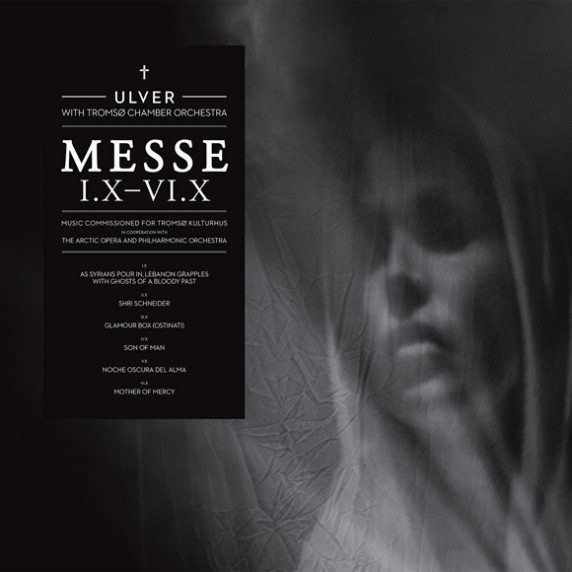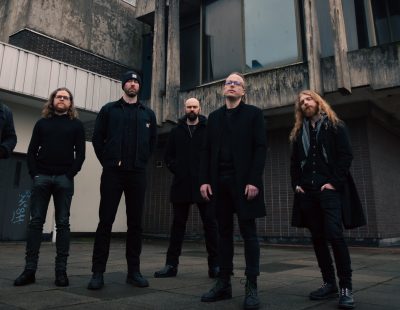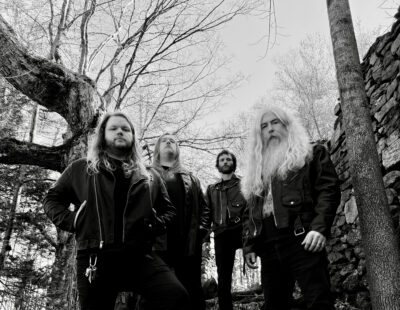** It’s been an age since Ulver have had anything to do with metal. Yet, somehow, Ulver, like others who departed from the dome of metal, have managed to capture our minds and hearts. Musically speaking, Ulver have very little business on the Deciblog—all things being fair—yet here they are, connected via an ability to communicate themes familiar with instruments and methods foreign. Sitting down on a digital chair with Ulver’s Kristoffer Rygg offered a chance to discuss new album, MESSE I.X–VI.X, and how Rygg and his fellow Ulverians are using it to “take back” that which they own.
This is your 20th year. What do you make of your timeline, at this point?
Kristoffer Rygg: It’s getting full—this is our 10th studio album not counting all the EPs, soundtracks, remixes and/or live albums we’ve done—and judging by MacArthur’s credo I’m getting old. More doubt and fear with each passing day. [Laughs]
Do you see the point of divergence (from metal) at Themes from William Blake’s The Marriage of Heaven and Hell?
Kristoffer Rygg: Yeah, definitely. Although we still had a bit of metal left in the body when we made that record I was getting generally critical towards the whole black metal “shtick” by then. That’s pretty evident by the music, of course, and its ambition to embrace such an array of styles and influences (too many in hindsight). But roses are planted where thorns grow. At the time, we had turned 20 and were starting to see things in a brighter light, so to speak. With that album we were obviously revolting against what we saw as totally narrow-minded rhetoric and cheap gimmicks coming from our contemporaries. Blake did the same in his time—not by simple negation, but by refining and/or challenging the perceptions and preconceptions of his fellowmen, and with a more keen take on religious traditions, theology and iconography, if I must say so. That was the draw to us. I’m obviously not alleging we were—or are—anywhere near Blake-level. Far from it, but we did see in his work a lot that we could relate to and which resonated in a time when we were changing as people and musicians. But we were young. Indeed, that record has a few “interesting” ideas going on. [Laughs]
Where has Ulver, in your opinion, traveled from Themes from William Blake’s The Marriage of Heaven and Hell?
Kristoffer Rygg: Well, from Blood Inside and onwards we have written a fair share of our own texts and presentations and perhaps established a tone now, or thématique which is a bit more down-to-earth, I gather. However, we still take inspiration from history and use metaphors/images from the Bible, etc. Musically, Wars of the Roses, for instance, is maybe not so far from certain things we would do back then? I still tune in to a lot of the same albums I discovered around those times. Of course, things have (r)evolved, but it is as you say, Themes was the point of divergence, or second advent of Ulver. It’s not a linear path we’ve been on, but we are still the same guys in many respects. Moved by beautiful contrasts, conviction and confusion, gratitude and grief, faith and doubt… So in a way it’s been a long history of questionable marriages, or wars within ourselves, up till now.
You’ve done soundtracks/scores, but I think the Live in Concert at the Norwegian National Opera DVD was a superlative moment. How did that all come together from cultural (acceptance) and logistical (number of people involved) viewpoints? ** the reason I ask is Dimmu Borgir also went through an acceptance phase (culturally) to eventually be involved with the NRK and KORK for their orchestral performance.
Kristoffer Rygg: I’m not so sure neither Dimmu Borgir nor Ulver are—or even want to be—accepted in the “card-carrying member of the establishment” sense. Also, I don’t really feel that the two bands belong in the same category, culturally, but I see what you’re getting at. Of course, it comes to a point where the powers that be no longer can deny or suppress phenomenons. I can’t speak for Dimmu, but we’ve quite simply accepted special invitations extended to us in recent years, and I suppose that means there’s a recognition of sorts. But you know, there’s a rebel rooting for the underdog in any organization. I’m not sure how much to put into it. When we wrote music for the Tromsø Chamber Orchestra we made it with classical in mind and we also had good help from composer Martin Romberg, who arranged the scores for all the players. I perceive MESSE I.X–VI.X as a quite modern electronic/orchestral piece and it has very little, if anything, to do with rock and roll. You mention the Opera, which was also a big event by all means, but that was three years ago and sans orchestra.
Generally, there’s a sense of skepticism from the Classical community towards modern music. Was that the case with the Norwegian National Opera and by extension the Tromsø Chamber Orchestra? Curious how the minds met, so to speak.
Kristoffer Rygg: Classical music suggests something conservative and old-fashioned and can be a bit misleading, that way. I mean, you have modern classical music, which is a bit of a contradiction, so. Actually, in my experience people from the “classical community” are often the most non-compromising and/or radical rascals you’ll find. I’ve never encountered that “problem” really. Plus, you’ll find sourpusses in every scene. The biggest challenge, as I see it, is often because one comes from different backgrounds and don’t have the same lingo. But in the end it’s all comes down to music. We had, as I said, good help and a mutual intent, so we found common ground… Those guys seemed just as fascinated by our approach and/or technique as we were by theirs, really. A concentrated congregation, by all means.
What was it like working with the Tromsø Chamber Orchestra?
Kristoffer Rygg: A bit nerve-wracking at first, but that quickly waned. Those guys come from a different world, but that’s what makes the liaison interesting, isn’t it? I think we all had that predisposition. I have nothing but positive things to say about the Chamber Orchestra. I had a great time in Tromsø and I think they enjoyed it too. Actually, we recently did this performance again, in Germany with the Stüba Philharmonie, and those guys were possibly more unbuttoned than us. Was great.
And this piece was commissioned for the Tromsø Chamber Orchestra, correct? What does that entail from artistic and business points of view?
Kristoffer Rygg: Yeah, they asked us to do new music, so we early on put down the prerequisite to “use the occasion” for later as well. The Tromsø people offered us a very good deal, to make it happen, but it was not in itself enough to justify months in preparation, writing all new music, lyrics etc. from scratch—all the work it actually meant for us, that is. It was part of the deal between us that it should eventually become a new Ulver album. It’s our body of work, even though it comes with a few strings attached. [Laughs] If you are asking if we have to pay royalties to the orchestra or something, the answer is no. The chamber orchestra get hourly wages from the larger Arctic Opera and Philharmonic Orchestra institution.
Take us through MESSE I.X–VI.X, please. Inspirations, motivations, and so forth.
Kristoffer Rygg: Ah, I’m not sure that is possible, or favorable. I’m definitely one of those who thinks it is best if the listener isn’t over-informed; it is prophecy in the things you don’t know. That is also why we choose to keep our “press release” short this time: ULVER MESSE I.X–VI.X Music commissioned for Tromsø Kulturhus in cooperation with the Arctic Opera and Philharmonic Orchestra. Composed and first performed by Ulver, on primarily electronic instruments, with the Tromsø Chamber Orchestra September 21 2012. The assistance of Martin Romberg—God bless his Viennese heart and arrangements – has been invaluable. Much of this was recorded live, yet it is not a live album. We’ve spent long hours in the studio translating what happened that night. We are at peace for now. It is more quiet than normal. More modern than medieval. But there will always be rapture. Consecration and crying. The father, the mother… and ghosts. Shadows reverberates—it feels like a companion piece—and Silence’s erratic electronique. Sample culture. War and vulture. People hurt. In spite we love. Our children. We fear their future. Remember Górecki’s No. 3: Symphony of Sorrowful Songs. It has haunted us for years, and probably always will. Gustav Mahler and Holst. Sound collages from When or Nurse With Wound. ’70s kraut and synth. Ash Ra and Autobahn. ’80s pop scores. John Carpenter and Tin Drum. Terry Riley, again and again and again. Saint John of the Cross. By now, most of you know where we come from. The rest is silence. Ulver, Purgatory, spring 2013.
I can also share with you the two texts we wrote, to accompany the music. “Son of Man”: OH FATHER – HEAVENLY FATHER – FORGIVE ME – FOR I HAVE SINNED – AGAINST YOUR WORD – IN SADNESS AND JOY – IN RAINBOW LIGHT – AND THE DARK WOODS – CHILDHOOD HAUNTS – THE TWILIGHT OF MY LIFE – THE HEART STOPS – WITHOUT WARNING – THE DESTRUCTION OF THE TEMPLE – THE BROKEN HOME – OH FATHER – WE ARE DEFINED – BY OUR BLOOD – THE MASSACRE OF THE INNOCENTS – AND THE SACRIFICE OF THE SON – WHAT KIND OF CHOIR – OF ANGELS WILL RECEIVE US
And “Mother of Mercy”: OH MOTHER – MOTHER OF MERCY – CRADLE OF ALL – DEVOTION AND DESIRE – I TURN TO YOU – FROM THE VALLEY OF TEARS – CARRY ME AS A CHILD – AS A SON OF MAN – BATHED IN LIGHT – AND PRECIOUS BLOOD – FILLING THE CUP – OF THE SKULL OF ADAM – CRYING AT THE FOOT – OF THE CROSS – OH MOTHER – PURE AND SIMPLE – VIRGIN AND WHORE – THE WOMEN OF JERUSALEM – ALONG THE WAY OF SORROWS – SPEAKING OF GHOSTS – IN THE HOLY CITY
Is there a political angle to MESSE I.X–VI.X? The opening track “As Syrians pour in…” would indicate some level of geo-political awareness. It’s also the title to a Reuters news piece.
Kristoffer Rygg: That’s right. I actually wanted Reuters and the date of that news piece in brackets, since it is so obvious, but Jørn [H. Sværen] insisted it was better if people Googled it. He loves the notion of people going a bit “what the fuck,” looking for clues etc., even if there aren’t always any to be found. This appropriation is not any more, or less, political other than an indication of concern. We live in troubled times. The song itself has a distinct Middle Eastern feel to it and coupled with sounds of vultures and war that title seemed both appropriate as well as contemporary. But we have no ideology for sale. Only our sadness.
What about a religious angle? I guess I’m being obvious.
Kristoffer Rygg: You’re wondering if we’ve turned Christian, right? It gives me diabolical joy to leave that one open.
You’re calling MESSE I.X–VI.X a “righteous DIY project.” What do you mean by that?
Kristoffer Rygg: It’s righteous. The opposite of the greedy and unkind industry-standard, where the artist often is forced to accept very bad terms and left in huge debt to the label, etc. We decided this time to privately borrow money to produce the album, manufacture it ourselves, then sell as much as we can direct to our fans via mail-order, etc., without too many intermediaries—we only have one external guy now, Neuropa, who does the actual mail-order job—and break even ourselves first for a change. We are definitely turning the tables around a bit. There are, of course, benefits to being on a bigger label, the dispersion and promotion, etc., so when we have sold our initial run of 3,000 and payed our loan back, Kscope will take over on a non-exclusive basis. Those who buy our edition(s) will not regret it though.
Looking at history, both Radiohead and Nine Inch Nails tried to render record labels and the music industry useless by using a free/pay-what-you-want system. If I remember correctly, both concepts had varying degrees of “success.” As an artist, what do you make of the legacy music industry model and ideas put forth by Radiohead and Nine Inch Nails?
Kristoffer Rygg: I don’t have a strong relation to any of these bands. I remember I liked Kid A a lot in the ’90s, and heard about that campaign a few years ago. It was no doubt a smart initiative, and seems sympathetic and all, but at the same time there’s little risk involved for those guys. They are both hugely successful bands and are likely to have a few stacks in the bank already. There are not many bands who can really pull that stuff off with great success. You have to get quite a few 5 or 10 Euro digi-purchases in order to get a studio budget back if you know what I’m saying. Not to mention some compensation for all the time and effort you and your bandmates put into making an album, right? But at the moment that seems almost too much to hope for. It’s simply not working very well at the moment, the music business. People have to realize that it still costs a lot of time and money to record and produce these albums (not necessarily talking bedroom/laptop/plug-in type albums here) and that if fans don’t financially support stuff they actually love and listen to they will in effect X-out their own favorite artists. I am actually hoping for a price jump in nice and elaborate packaging. People definitely are not buying the same quantities as in the CD heydays, so when you first want an objet d’art maybe it’s not such a big deal if it costs a bit more? I’m just wondering… Stuff like this leather-bound vinyl edition we just did is cool, and I think more and more things like that is gonna become standard. It was expensive as hell to make, but since we sold it at 50 Euros we had a surplus, from a very limited run, you know. And it sold out in a matter of hours so it’s really win-win. The die-hard fans get something exclusive to cherish. And if they don’t they can always sell it on Discogs at inflated prices in a couple years.
Next year will be your 21st year. Ever thought about going back to the first three albums and re-interpreting them? Or, from a metalhead’s perspective, a follow-up or prequel to Bergtatt?
Kristoffer Rygg: We actually did that some ten years ago now, with Nattens Madrigal, where we re-recorded those songs with a string quartet (same players who are on Shadows of the Sun) and started programming electronic rhythms on top, etc., but the project was abandoned for various reasons. MESSE I.X–VI.X is kind of picking up on those threads in some respects. I’ve also entertained the notion of a Kveldssanger pt. 2. It would be interesting to see where that could lead now. But I don’t think you will see me returning to black metal form any time soon. I know there’s a lot of love for those early albums out there, and appreciate that, but at the same time I have to say that I think our best work lies outside of metal.
** Ulver’s new album, MESSE I.X–VI.X, is available August 1st through the band. It’s available HERE in a variety of formats and packages. It looks and sounds brilliant, so if you’ve found solace in any of Ulver’s recent work, then MESSE I.X–VI.X should make your dark heart a bit brighter.






